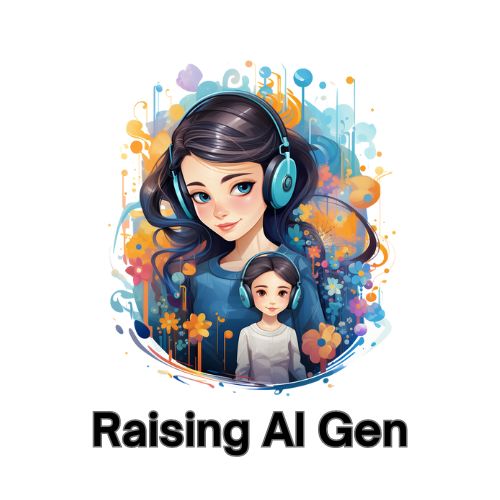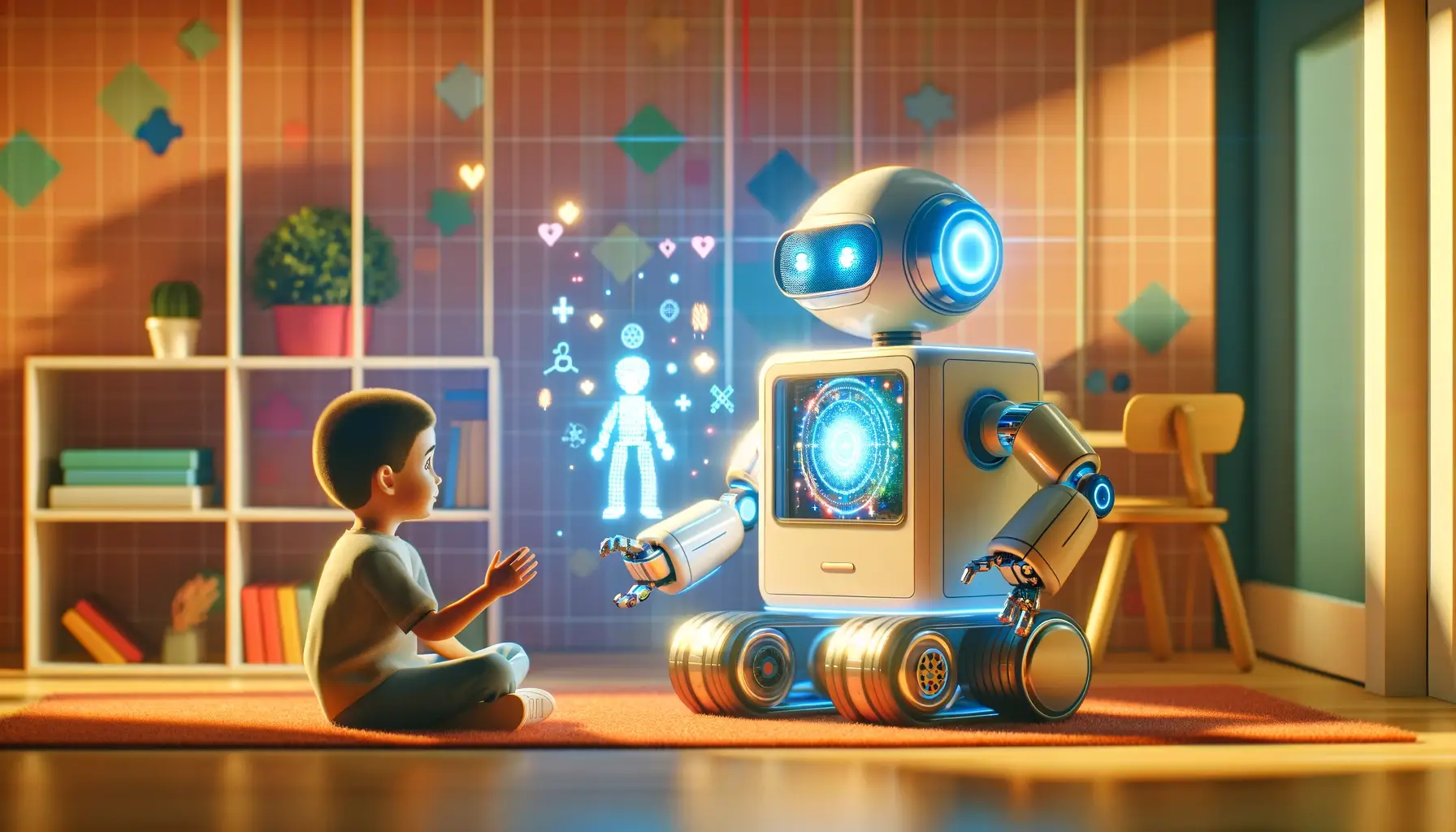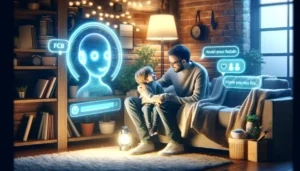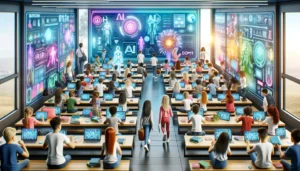The journey through childhood can be markedly different for the one in every 160 children diagnosed with autism spectrum disorder. In the United States, where incidence rates are nearly triple the global average, the quest for effective autism therapy has never been more urgent. Central to this pursuit are social skills development — an area where challenges are most pronounced for children on the spectrum.
Revolutionizing this realm is AI-powered social skills training for autistic children, an approach that leverages artificial intelligence to tailor interventions to each child’s unique needs. Beyond the limitations of traditional therapy, AI opens doors to consistent and engaging learning experiences, ensuring that every child has access to the focused support they require.
The implications of AI in the sphere of autism therapy are transformative. Children are finding a new friend in robots, entities that go beyond the programmable to predict, respond, and evolve with the child’s interaction patterns. This companionship provides not just practice but also the potential for meaningful relationship-building skills, all within the comforts of home.
Key Takeaways
- AI-driven therapy provides personalized social skills enrichment.
- Children interact with AI robots, enhancing engagement and learning.
- Artificial Intelligence integrates seamlessly with in-home routines.
- Robotic companions adapt to children’s social and emotional needs.
- Innovative AI technology offers new horizons in autism support.
Understanding Autism and the Need for Targeted Social Skills Training
The increasing incidence of autism spectrum disorder calls for a nuanced understanding of its implications for children and their families. Recognizing the unique hurdles faced by individuals with autism, particularly in the realm of social engagement and communication, underscores the necessity for specialized approaches in therapy and education. As we delve into this pressing need, it’s essential to consider both the prevalence of autism in the US and the inherent challenges within traditional therapeutic modalities.
The Prevalence of Autism Spectrum Disorder in the United States
Autism spectrum disorder represents one of the most common developmental disabilities today, with a notably higher occurrence in the United States compared to global statistics. This disparity emphasizes a critical demand for effective interventions and resources tailored to meet the escalating needs of this diverse population. Autism affects not just the individuals diagnosed but also their families, educators, and healthcare providers, creating a ripple effect that necessitates systemic support and innovation.
Challenges in Traditional Behavioral and Speech Therapies for Autistic Children
While conventional communication skills training and emotional intelligence training have made significant inroads, they often fall short in addressing the full spectrum of needs that autistic children present. Limited access to personalized care, financial barriers, and the one-size-fits-all nature of many programs can impede progress. Furthermore, navigating the expansive variability in autism symptoms is a considerable challenge, compounding the intricacies of implementing standardized therapeutic interventions.

The Significance of Early and Personalized Interventions
Studies advocate for the profound impact of early and individualized intervention in the development trajectory of children with autism. This tailored approach can be pivotal in cultivating vital social interaction skills, often through innovative tools and methodologies. Leading the charge are socially-assistive robots enhanced with AI, which promise to offer more accessible, customized, and consistent training environments. These technological allies are not just aids but also companions, reinventing the way social skills training is conceived and delivered.
To illustrate the transformative power of personalized care, consider the following table that contrasts traditional vs. AI-enhanced therapeutic options for autism:
| Social Skills Training | Traditional Therapies | AI-Enhanced Interventions |
|---|---|---|
| Personalization | Limited by resources | Highly customized to individual needs |
| Accessibility | Often constrained by cost and location | Improves with technology adoption |
| Consistency | Varies significantly | Constant, with potential for 24/7 support |
| Engagement | Depends on human resource availability | Interactive AI fosters sustained interest |
| Scalability | Limited scalability | Easily scalable to meet growing demands |
The interplay of AI and therapeutic practices is not only redefining the landscape of autism therapy but also expanding the horizons for countless children, ensuring they receive the compassionate and competent support they deserve.
The Promise of AI Technology in Autism Therapy
The advent of AI technology in the realm of autism therapy brings with it a wave of optimism for families seeking personalized care for their children. Unlike the conventional one-track approach, artificial intelligence in autism therapy has the potential to revolutionize the way we address the diverse challenges posed by the spectrum. Groundbreaking research by Maja J. Matarić and her team at the University of Southern California has set a new benchmark for social skills training by creating AI-driven socially-assistive robots that can accurately predict a child’s engagement levels with 90% accuracy.

These intelligent machines are at the forefront of providing customized learning experiences, moving beyond simple rote repetition. They harness the nuances of audio and video cues to provide targeted feedback, ensuring that autistic children are not just heard but genuinely engaged. This is the essence of personalized care – an AI-crafted experience that adapts in real time to the interaction and emotional state of its young users.
The robots offer more than mere company; they’re equipped with the ability to dynamically alter their engagement methods to hold the child’s attention, significantly extending the duration and effectiveness of therapeutic exercises. Imagine a learning companion that not only grows with the child but does so with the personal touch that historically only a human therapist could provide. This is where the dream of in-home AI assistance merges with the reality of meaningful therapy progression.
| Feature | Benefit in Autism Therapy |
|---|---|
| Customized Feedback | Activities are adapted based on the child’s responses, leading to more effective learning. |
| Engagement Prediction | Early detection of disengagement allows for interventions that maintain the child’s interest. |
| Expressive Interactions | Robots give nuanced feedback, making the interactions more stimulating and rewarding. |
| Reinforcement Learning Algorithms | Games and tasks become increasingly personalized to challenge and support the child’s development. |
| Real-Time Adaptation | Therapeutic activities are adjusted in real time to suit the child’s current engagement and skill levels. |
All this is not to comment on the scope beyond the data; it is to underline the potential that AI has in morphing into a tool of unprecedented personal support. It’s creating an environment where social skills are not taught but mastered, where personalized interaction paves the way for a child’s better future. It’s about embracing the strengths of these children while deftly navigating the challenges to uncover a world they can confidently navigate.
As AI continues to advance, the promise it holds isn’t just in maintaining engagement or providing companionship. It’s in the broader realm of personalized care, where every autistic child’s developmental path is seen and supported, one unique step at a time. When we talk about the integration of AI technology and autism therapy, we’re no longer merely discussing potential. We’re witnessing the blossoming of a revolutionary and empathic approach in action, reshaping lives one interaction at a time.
AI-Powered Social Skills Training for Autistic Children
The integration of artificial intelligence into social skills training is offering a new beacon of hope for autistic children and their families. By providing personalized learning experiences that adapt in real-time, AI-powered interventions are setting a new standard in therapy and education for children on the autism spectrum. These innovative solutions have shown promise in not only improving engagement but also in promoting genuine social skill development within the comfort of one’s home.
How Artificial Intelligence Enhances Social Skills Learning
Artificial intelligence shines in its ability to create adaptive learning experiences tailored to the individual needs of each child. By meticulously analyzing engagement and interaction patterns, AI-driven programs can modify teaching approaches on the fly, ensuring that children remain captivated and motivated in their learning journey. This dynamic interactivity is particularly critical for maintaining the attention and interest of autistic children, who often benefit greatly from structured yet flexible learning environments.
In-Home Robots as Companions: Case Studies and Research
In-home social skills training through the use of robots provides a consistent, interactive companion for children on the autism spectrum. Not just a technological marvel, these AI-powered companions become genuine friends to their users, encouraging improved empathy and social interaction, not only with the robotic companion but with family members and peers as well. Conclusive research and practical case studies have shown children exhibiting marked improvements in their ability to express and understand emotions, as well as in their overall social engagement, all due to the regular interaction with these AI companions.

Privacy Considerations and Ethical Implications of AI in Autism Therapy
The revolutionary strides in therapeutic AI-powered interventions also bring to the forefront the significant issue of privacy in AI therapy. As AI systems require the processing of sensitive personal data to function effectively, there is a concerted effort within the scientific community to minimize the amount of data needed. This strikes a crucial balance between providing personalized therapeutic experiences and safeguarding the privacy of the individuals involved. Additionally, continuous discussions on ethical implications ensure that AI serves as a complement to human therapy, enriching rather than replacing the human touch that remains so vital in therapeutic settings.
AI not only challenges the status quo in autism therapy but also sets the stage for a future where accessibility, privacy, and personalized care come together to support the growth and development of autistic children across the United States.
Embracing AI: The Future of Autism Support and Development
The horizon of autism support is being reshaped by the burgeoning influence of AI technology. This digital frontier is not only transforming therapeutic approaches but is also creating personalized learning ecosystems for individuals with autism spectrum disorder (ASD). With AI-driven insights, the science of autism therapy is reaching new peaks of efficacy, where bespoke interventions are not just imagined but thoroughly implemented. In this progressive chapter of autism support, we’re observing a transition from broad-spectrum treatments towards more nuanced and individualistic strategies.
Personalization and the Role of AI in Individual Learning Pathways
At the center of this transformative journey is the personalization in autism therapy, where AI stands as a pillar of individual learning. By integrating artificial intelligence in early detection and developmental mapping, there is a potential to chart out a personalized pathway that transcends the conventional barriers of therapy. Each child’s unique behavioral and engagement patterns are mapped meticulously, enabling the development of a finely-tuned support structure that grows and evolves with the child – a true testament to the adaptability and responsiveness that AI brings to the table in nurturing young minds.
AI’s Role in Early Detection, Diagnosis, and Accessible Therapy
An equally critical facet of AI’s application is in the realms of early detection and diagnosis, where it plays a key role in pinpointing developmental variances that may be indicative of ASD. The earlier autism is identified, the more significant the impact of interventions can be. Furthermore, AI is democratizing the availability of therapy, making it an accessible AI-powered therapy for families who otherwise might lag in the quest for suitable resources. In this light, AI isn’t just a facilitator of therapeutic processes; it’s a gateway to inclusivity, ensuring that every child has the opportunity for growth and learning, regardless of geographical or socioeconomic boundaries.
Navigating Ethical Concerns: The Balance between Tech and Human Oversight
While the benefits are manifold, the ethical concerns in AI applications within autism therapy are of paramount importance. The duty to uphold data security and privacy lies at the core of these technological endeavors. The interplay of machines and empathy is delicate, necessitating a vigilant approach to maintaining human oversight alongside AI’s capabilities. As we steer towards this AI-enriched therapeutic future, our moral compass must guide us to ensure that the deployment of AI respects the dignity, individuality, and privacy of those it intends to aid, setting a precedent for a responsible fusion of technology and humane care.
Frequently Asked Questions
| Question | Answer |
|---|---|
| How can AI help autistic people? | AI can assist autistic individuals by providing personalized learning experiences, enhancing communication skills, and offering interactive, engaging therapy sessions tailored to individual needs. Advanced AI technologies, like socially-assistive robots, use machine learning to adapt to each child’s unique behaviors and learning styles, making therapy more effective. |
| How can AI help with autism? | AI helps in autism therapy by offering tools for early detection and intervention, personalized educational content, and behavior analysis. It can also facilitate non-invasive, consistent, and engaging interaction, especially for children who may find human interactions challenging. |
| How can I improve my autistic child’s social skills? | Improving an autistic child’s social skills can be achieved through structured social skills training programs, interactive play with socially-assistive robots, and consistent, personalized therapy sessions. Engaging in regular, guided activities that encourage communication and interaction plays a crucial role in skill development. |
| What is the social skills training program for autism? | A social skills training program for autism is a structured approach that uses various techniques and activities to improve social interaction abilities. These programs often include role-playing, social stories, and interactive games, and may incorporate AI-powered tools to provide personalized and adaptive learning experiences. |
| Are AI-powered therapy tools safe for children with autism? | AI-powered therapy tools are designed with safety and user-friendliness in mind. While they offer innovative ways to enhance learning and therapy, it’s important for parents and therapists to monitor their use and ensure they complement, rather than replace, human interaction and traditional therapies. |
| How does AI personalize therapy for autistic children? | AI personalizes therapy by analyzing individual behavioral patterns, learning styles, and progress. It adapts activities and interactions based on real-time feedback and data, ensuring each session is tailored to the child’s specific needs and developmental level. |
| Can AI robots replace human therapists in autism treatment? | AI robots are not intended to replace human therapists but to supplement and enhance traditional therapy methods. They provide additional resources and support, offering consistent, repetitive training that can be hard for human therapists to sustain over long periods. |
Further Reading
| Title | Link |
|---|---|
| AI Tools for Unveiling Behavioral Disorders in Children | Read More |
| AI Tools for Autism | Read More |
| AI for Autism | Read More |
| AI for Language Learning | Read More |
| AI Tools for Teachers | Read More |
| AI for Educators | Read More |
| AI Speech Therapy | Read More |
| AI Personalized Learning | Read More |
| AI in Education Books | Read More |
| Is There an AI for Mental Health? | Read More |
| How is AI Used in Mental Health? | Read More |
| Robots that teach autistic kids social skills could help them develop | Read More |
| Social Skills Training for Children and Adolescents With Autism Spectrum Disorder: A Randomized Controlled Trial | Read More |





